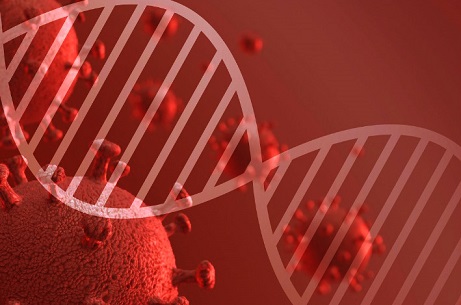Nikhil Prasad Fact checked by:Thailand Medical News Team Dec 16, 2024 1 year, 2 weeks, 2 days, 13 hours, 15 minutes ago
Medical News: The loss of smell, medically known as anosmia, has been one of the most talked-about symptoms of COVID-19 since the early days of the pandemic. Many people who got infected by the SARS-CoV-2 virus reported this symptom, with some recovering their sense of smell in weeks, while others faced prolonged anosmia for months or even years. For those affected, this condition significantly impacted their quality of life, making it hard to enjoy food, detect hazards like smoke or spoiled food, or even recognize everyday scents like flowers or perfumes. The condition is not just a minor inconvenience but has been linked to emotional distress, depression, and social isolation.
 New Discovery Links Loss of Smell in COVID-19 to Epigenetic Changes
New Discovery Links Loss of Smell in COVID-19 to Epigenetic Changes
To uncover the cause behind this long-term loss of smell, a group of scientists recently conducted a groundbreaking study focusing on epigenetics. This
Medical News report will explore their findings, shedding light on how DNA changes in the body may hold the key to understanding why some individuals lose their sense of smell after COVID-19.
What Is Epigenetics and Why Does It Matter
Epigenetics refers to changes in how genes function without altering the DNA sequence itself. These changes often occur through a process called DNA methylation, which involves adding chemical tags to specific parts of DNA. Such modifications can influence whether certain genes are active or inactive.
Researchers have long studied genetic changes in COVID-19 patients experiencing anosmia, and past studies have identified genetic variations near the UGT2A1 and UGT2A2 genes as likely contributors. However, epigenetic changes in other related genes have remained largely unexplored. The study highlights how a specific gene, UGT1A1, may play a crucial role in persistent anosmia.
The Research Team and Study Approach
The research was led by a multidisciplinary team comprising experts from various institutions, including: Biruni University-Turkey, London Metropolitan University-United Kingdom, Seyh Edebali University-Turkey and Erciyes University-Turkey.
The team focused on studying the epigenetic changes in the UGT1A1 gene in COVID-19 patients with anosmia. They specifically investigated DNA methylation levels in this gene to determine whether differences in methylation could explain the loss of smell.
How the Study Was Conducted
The study included two groups of COVID-19 patients:
-Those who retained their sense of smell (normosmia)
-Those who experienced prolonged loss of smell (anosmia) for over a year after infection.
Each group consisted of 20 individuals, matched in terms of age and sex to ensure reliable results. Blood samples were collected from all participants, and DNA was extracted from these samples for analysis. The team used advanced techniques to measure DNA methylation levels at the UGT1A1 locus, specifically focusing on a region of the gene linked to olfactory function.
Key Findings of the Study
The researchers discovered a significant difference in DNA methylation levels between the two groups. Patients who experienced anosmia showed 14% lower DNA methylation in the UGT1A1 gene compared to those with normal olfactory function. This difference was highly statistically significant (p < 0.0001), meaning it is unlikely to have occurred by chance.
DNA methylation normally helps regulate gene activity, and reduced methylation in the UGT1A1 gene could potentially disrupt its function. While UGT1A1 is not as well-studied as other genes like UGT2A1, it belongs to the same family of genes responsible for processing odorants in the nasal cavity. The findings suggest that epigenetic changes in this gene may contribute to the long-term loss of smell observed in COVID-19 patients.
Why These Findings Matter
The results of this study are significant for several reasons:
-New Understanding of COVID-19 Anosmia: The study reveals, for the first time, that epigenetic changes in a specific gene are associated with prolonged loss of smell in COVID-19 patients.
-Potential Biomarker for Diagnosis: DNA methylation levels in the UGT1A1 gene could serve as a biomarker for identifying individuals at risk of long-term anosmia.
-Basis for Future Treatments: Understanding the epigenetic mechanisms behind anosmia opens new possibilities for developing treatments that target these changes. For example, therapies could be designed to reverse DNA methylation patterns and restore normal gene function.
Limitations of the Study
Although the study provides novel insights, the researchers acknowledge certain limitations. The sample size of 40 patients (20 in each group) is relatively small, and the findings need to be validated in larger, more diverse populations. Additionally, the study analyzed blood samples, which may not fully reflect what happens in the nasal tissues where the sense of smell originates. Future studies will need to examine methylation changes in olfactory tissue to confirm these results.
Conclusion
This study offers a new and promising explanation for why some COVID-19 patients suffer from prolonged loss of smell. The researchers discovered a significant reduction in DNA methylation levels in the UGT1A1 gene among patients with anosmia, highlighting a potential role for epigenetic mechanisms in olfactory dysfunction. These findings pave the way for future research into targeted treatments and diagnostic tools for anosmia, not just in COVID-19 but in other conditions affecting the sense of smell.
While more studies are needed to confirm these results and explore their broader implications, the research marks an important step forward in understanding the long-term effects of COVID-19. By uncovering the role of epigenetic changes, scientists are now closer to finding solutions that could restore olfactory function for millions of affected individuals worldwide.
The study findings were published in the peer-reviewed journal: Diagnostics.
https://www.mdpi.com/2075-4418/14/24/2823
For the latest COVID-19 News, keep on logging to Thailand
Medical News.
Read Also:
https://www.thailandmedical.news/news/breaking-swedish-study-shows-that-sars-cov-2-causes-epigenetic-changes-to-various-genes-in-human-host
https://www.thailandmedical.news/news/study-finds-that-long-covid-linked-to-accelerated-aging-and-epigenetic-changes
https://www.thailandmedical.news/news/breaking-covid-19-news-israeli-and-american-study-shows-epigenetic-changes-occurring-with-elevated-a-to-i-rna-editing-in-covid-19-infected-individuals
https://www.thailandmedical.news/news/breaking-news-study-uncovers-epigenetic-crosstalk-between-covid-19-mrna-vaccines-and-human-genes-with-potential-health-implications
https://www.thailandmedical.news/news/breaking-news-covid-19-exposure-during-pregnancy-leads-to-epigenetic-changes-in-newborns,-paving-the-way-for-health-issues-later-in-life
https://www.thailandmedical.news/news/breaking-us-scientists-find-that-covid-19-leaves-lasting-epigenetic-footprint-that-results-in-long-term-immune-dysregulation
https://www.thailandmedical.news/news/long-covid-news-sars-cov-2-infections-causes-epigenetic-changes-that-contributes-to-health-issues-seen-in-long-covid
https://www.thailandmedical.news/news/south-african-study-finds-that-covid-19-leads-to-epigenetic-changes-in-host-immune-genes-which-can-be-prevented-or-reversed-by-vitamin-d
https://www.thailandmedical.news/news/new-study-by-cornell-university-shows-sars-cov-2-causes-epigenetic-changes-to-innate-immune-cells-and-their-progenitors,-contributing-to-long-covid
https://www.thailandmedical.news/news/breaking-study-discovers-that-sars-cov-2-orf8-encoded-protein-contains-a-histone-mimic-that-disrupts-human-host-cell-epigenetic-regulation
https://www.thailandmedical.news/news/international-study-finds-that-sars-cov-2-causes-epigenetic-changes-and-transcriptomic-reprogramming-in-monocytes-of-covid-19-patients
https://www.thailandmedical.news/news/breaking-covid-19-news-study-finds-that-m6a-methylation-plays-a-key-role-covid-19-infections
https://www.thailandmedical.news/news/breaking-news-even-asymptomatic-sars-cov-2-infections-cause-dna-methylation-and-epigenetic-changes,-leading-to-immune-dysregulation
https://www.thailandmedical.news/news/breaking-covid-19-news-sars-cov-2-infections-lead-to-cellular-m6a-rna-methylation-loss-in-host-cells-possible-implications-for-cancer-and-other-issues
https://www.thailandmedical.news/news/breaking-u-s-study-finds-that-sars-cov-2-infections-and-mrna-jabs-alter-dna-methylation-states-of-immune-cells-and-epigenetic-clocks-of-humans
https://www.thailandmedical.news/news/yale-researchers-warn-of-dna-methylation-dysregulation-in-long-covid
https://www.thailandmedical.news/news/severe-covid-19-has-a-distinct-cell-free-dna-methylation-signature
https://www.thailandmedical.news/news/covid-19-causes-blood-dna-methylation,-a-potential-biomarker-for-long-covid-severity
https://www.thailandmedical.news/news/covid-19-causes-dna-changes-and-accelerates-aging
